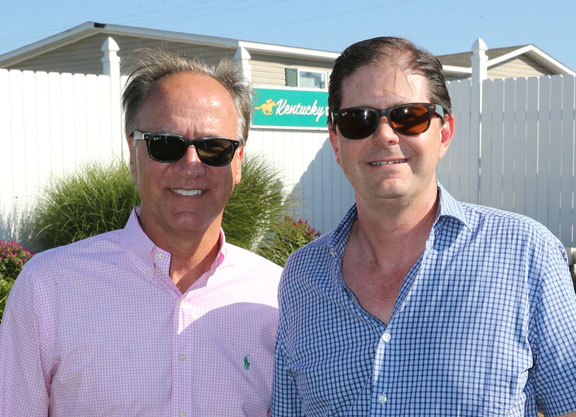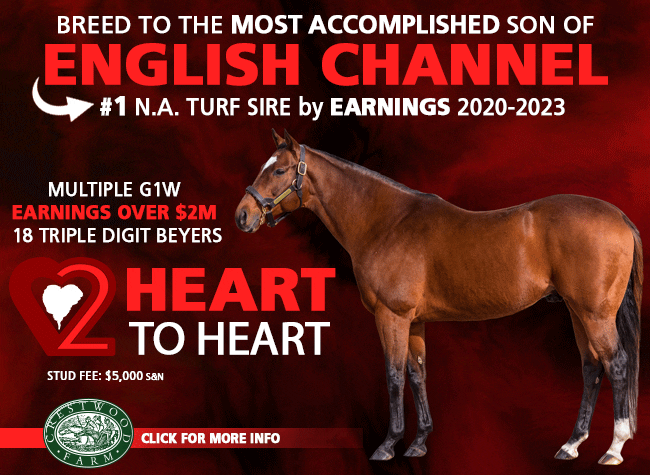By T. D. Thornton
Kentucky Downs is one of America's most unique racecourses. Its annual all-turf, five-day race meet takes place over an expansive and undulating grass course. Horsemen are lured by a nation-leading average of over $2 million in purses per day, and the boutique meet is popular with bettors thanks to an impressive average field size (11.26 starters/race in 2019) and a low takeout structure. The driver of the enhanced purses is historical horse race (HHR) gaming, which Kentucky Downs pioneered in 2011. A year later, Kentucky Downs began distributing its gaming revenues as purse enhancements to other in-state tracks, which has helped to spark a renaissance of the entire Kentucky circuit.
One year ago this week, a partnership headed by Las Vegas-based entrepreneur and Thoroughbred owner Ron Winchell and gaming executive Marc Falcone announced an agreement to buy Kentucky Downs. The new owners took over in March, and on Nov. 14 they held a ceremonial groundbreaking to detail a multi-year, three-phase facilities expansion.
TDN spoke with Kentucky Downs' co-managing partner Winchell prior to Thursday's press conference to get an over-arching sense of what the massive project means for Kentucky Downs and the state's racing circuit. An edited transcript follows.
TDN: Your family's Winchell Thoroughbreds owns more than 120 horses, including racing and breeding stock, and you campaigned 2017 Horse of the Year Gun Runner and the renowned sire Tapit. But you also have background in construction, real estate development, and operating gaming-themed bars and restaurants in Las Vegas. Even given that dual experience of racing/gaming, owning and operating a racetrack can be a different beast. What was the appeal for you to get involved with Kentucky Downs?
RW: I like to say it's the culmination of my two worlds, which would be involvement in gaming, which I've been doing for the last 20 years, and horse racing. So this is just really kind of a natural fit. When it came to HHR, I clearly saw an opportunity for what it is going to do for racing, essentially elevating the entire state of racing in Kentucky. So it was really an opportunity where those two worlds came together, and it made a lot of sense. Plus it was just being in the right place at the right time.
TDN: Was owning and operating a racetrack something you were specifically looking to get into, or was there something about Kentucky Downs that made you not want to pass it up?
RW: Racetracks, as you are aware, have been difficult assets the last 20 years. HHR makes it so they're not a difficult asset, if you will. It kind of changes it, brings it into this modern world where we all want instant gratification with everything we do now. And that's where racing struggles a little bit. It has to compete with–everywhere you go–80% of the people staring into their phones getting entertainment. Racing has kind of gotten a little bit behind, and with HHR, it really elevates [racetrack ownership] into something that made sense.
TDN: Two-part question. What are some aspects of running a racetrack that in your first eight months at the helm have pleasantly surprised you, and what have you found challenging or unexpected? Pleasant surprises first.
RW: I've taken over a lot of small gaming properties. You're going in and finding out that sometimes current management isn't where it needs to be. But what we discovered here is that there are a lot of great personnel in place. They were doing a good job, and that was a pleasant surprise because we didn't have to come in and re-shape things up. So we've been slowly adding components to improve, in our view, where it needs to go from a management perspective. That kind of surprised us in that maybe we had a little bit less work to do than we anticipated.
TDN: Challenging or unexpected?
RW: A challenge recently is that we've been trying to gain a couple of extra days for our race meet, and that proved to be a bigger challenge than what I originally anticipated. Kentucky Downs has done well, and the pari-mutuel wagering has been growing at a steady level, so you'd think a natural progression would be to add two days and nobody would have a problem with that. But it proved to be a little bit more challenging than I would have thought.
TDN: What will be the sweet spot for the annual number of race dates for Kentucky Downs? Have you considered adding a second short-duration meet at a different time on the calendar?
RW: We'll continue to work on adding a couple more days. Hopefully [in 2020], we can at least set the process in place to come up with a plan to do so. Going slowly is kind of our thing. We'd like to slowly expand and make things better all around.
Because we run an all-grass meet without a dirt or synthetic course, we really have to look at the weather to set our race dates. Too early in the spring, it's too cold and the grass hasn't grown yet. And if you get too far into summer it's too hot. So that's a little bit of a limiting factor for us, and it's why we stick close to September.
TDN: Your geographic market is 40-mile straight shot north of Nashville, just over the Kentucky border from Tennessee. Beyond infrastructural improvements, what else do you envision being in the mix to grow the business locally?
RW: Kentucky Downs is essentially out in the country. It's not in a city center, and we get a lot of positive feedback from people who like to come on race day, set up a picnic, and just enjoy the day. So we'll kind of play on that theme and add some entertainment. We really want to make it so that people put our short window of live race days on their calendars knowing they'll come out here and have a great time.
TDN: Although Kentucky Downs over the past seven years has contributed varying amounts for purses to the state's other four Thoroughbred venues, the association with Ellis Park stands out. In 2019, the amount was $5 million, or 56% of what Ellis paid out in total purses. Giving Kentucky outfits an incentive to stick around for the summer not only helps Ellis, but it helps bolster the horse populations for race meets that follow at your track, Churchill Downs, and Keeneland. Can you speak about how this cycle got kickstarted?
RW: We generate so much of the purse money from HHR that we're very fortunate we can share it with other tracks. And I think that benefits everybody in the state of Kentucky, racing-wise. I'm super-bullish on Kentucky racing. It's all brought on by what the previous owners did at Kentucky Downs in bringing HHR to the forefront. I think the technology is coming for HHR to provide better product to invigorate the numbers and generate a lot more money for purses. Overall, we're not in the middle [of a renaissance]. We're kind of at the beginning of what we're about to see.
TDN: What are some consumer-facing examples of those technological improvements coming to HHR?
RW: HHR came aboard with a very limited market. And as that market grows, then more technology companies are willing to put investment money into providing HHR products. And the experience and marketing around what an HHR game will look like from five years ago to three years from now, it's going to be a whole different world. From a consumer perspective, the experience will be better, nicer. HHR is all based on previously run races, so it's how you present them that makes for the better experience. I also think [game manufacturers] are going to drill down on how people can feel like they're winning races easier or more frequently.
TDN: If you have your crystal ball fired up, please look into the future and tell me some of the things we might be talking about when we speak about Kentucky Downs in five years.
RW: The direction that we're all hoping that this is going is as an entertainment destination beyond the race meet, beyond HHR. We want this to be a synergistic property with other things to come here and do, and to really elevate and keep growing it. And I hope that in five years we look back and go, “OK, that was just the beginning.”
TDN: Widening the lens a little larger, what changes do you envision for the Kentucky circuit in that same time frame?
RW: You're already starting to see people shipping in from out of state and recognizing that the quality of racing is on the upswing. My family has raced at Churchill Downs for as long as I can remember, and now that the maiden races are in the $90,000 range, they aren't as easy to win, but the money's bigger [said with a chuckle]. And when you bet on horses, you want to have that good competition and big fields. We're here to bring some new ideas, bring some of our experience into this side of the business, and to promote it to its most positive.
Not a subscriber? Click here to sign up for the daily PDF or alerts.






